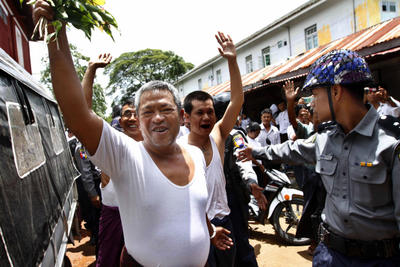As the reform process progresses, there is an urgent need for a new generation of law graduates capable of contributing to the development and consolidation of the law reform process.
In August 2012, it was announced that undergraduate degrees would begin to be offered once again by the University of Yangon and Mandalay University. This new cohort of students, to begin in December 2013, will include 15 LLB students in each of the law departments. These changes raise key challenges when considered in light of the history of legal education and the tertiary sector.
The history of legal education in Burma began at the then Rangoon University in 1920. For many years, it only offered a postgraduate law degree. It was not until 1965 that a full-time five-year course, referred to as an LLB degree, was offered. An LLM program was later established in 1973.
Yet legal education has suffered from the same interruptions of periodic forced closures by the government after various political crises that have plagued the tertiary education sector in Myanmar over the years. In more recent decades, the universities closed after the 1988 democracy uprising and did not open again until 1993. The most recent closure occurred in 1996 due to student unrest. This led to the cancellation of all undergraduate courses at the University of Yangon, which has only offered law as an LLM, Diploma degree or PhD since then.
Instead, the government established distance education programs, as well as several new universities, such as East Yangon University and Dagon University on the outskirts of Yangon. The effect of these changes was profound, leading to an oversupply of law graduates, reducing the value of the degree, and keeping students physically distant from the political centre.
The isolation of universities is now coming to an end in light of promising initiatives across the tertiary sector that will allow the universities to engage with a wide range of international partners. Collaborative projects are being established with several universities and international organisations, and regionally with the ASEAN Universities Network.
In fact, reforms and local academic initiatives have already occurred in unexpected places, something impossible prior to Myanmar’s transition. For example, one professor has published a book on the ‘Constitutional Writs in Myanmar’. It is a compilation of case notes on writ cases prior to 1971, yet it constitutes a radical contribution given that the constitutional writs have been ‘re-introduced’ via the 2008 Constitution. The book’s aim is to teach a future generation of law students about the significance of the writs as a mechanism for review of government decisions. By publishing past court precedents, it highlights the important place the writs once held in Myanmar. This is also timely given that over 400 writs cases challenging government decisions have been taken to the Supreme Court since 2011.
Yet legal education in Myanmar now faces a series of challenges, some shared by the tertiary education sector broadly and others specific to the discipline of law. Will law departments continue to offer nine-month diploma courses, which do not qualify a graduate to practise law? How will the University of Yangon make the shift from providing graduate degrees to also providing undergraduate education? And what is the future of distance education programs for degrees such as law?
There are many other challenges in terms of facilities and availability of legal resources. For example, university courses are required to be taught in English, yet the Myanmar Law Reports only record selected decisions of the Supreme Court in Burmese. Due to the influence of the socialist, and then military, regime on the judiciary, there is almost no case law in the teaching curriculum. This is also partly because the common law tradition of the doctrine of precedent suffered under successive regimes. These are just some of the challenges that will need to be addressed if legal education is to move forward.
Legal education is not isolated from, but in part depends on, broader legal reforms. This is not to claim that there is a direct correlation between the content and methods of legal education and the direction of the reform process. Debate still exists in many jurisdictions about how to both train students to become lawyers and provide them with a broad education that equips them with a wide range of skills. Yet there is no doubt that in the next decade law graduates will be instrumental to the next stage in the development of Myanmar’s legal system.
Dr Melissa Crouch is a Research Fellow at the Centre for Asian Legal Studies, the National University of Singapore. She recently represented NUS on a visit to the law departments of the University of Yangon and Mandalay, facilitated by the Ministry of Law (Singapore). This article represents her personal views.

